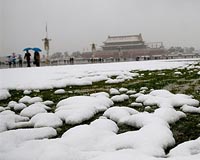 |
Durham NC (SPX) Nov 15, 2010 Leaks from carbon dioxide injected deep underground to help fight climate change could bubble up into drinking water aquifers near the surface, driving up levels of contaminants in the water tenfold or more in some places, according to a study by Duke University scientists. Based on a year-long analysis of core samples from four drinking water aquifers, "We found the potential for contamination is real, but there are ways to avoid or reduce the risk," says Robert B. Jackson, Nicholas Professor of Global Environmental Change and professor of biology at Duke. "Geologic criteria that we identified in the study can help identify locations around the country that should be monitored or avoided," he says. "By no means would all sites be susceptible to problems of water quality." Storing carbon dioxide deep below Earth's surface, a process known as geosequestration, is part of a suite of new carbon capture and storage (CCS) technologies being developed by governments and industries worldwide to reduce the amount of greenhouse gas emissions entering Earth's atmosphere. The still-evolving technologies are designed to capture and compress CO2, emissions at their source - typically power plants and other industrial facilities - and transport the CO2 to locations where it can be injected far below the Earth's surface for long-term storage. The U.S. Department of Energy, working with industry and academia, has begun the planning for at least seven regional CCS projects. "The fear of drinking water contamination from CO2 leaks is one of several sticking points about CCS and has contributed to local opposition to it," says Jackson, who directs Duke's Center on Global Change. "We examined the idea that if CO2 leaked out slowly from deep formations, where might it negatively impact freshwater aquifers near the surface, and why." Jackson and his postdoctoral fellow Mark G. Little collected core samples from four freshwater aquifers around the nation that overlie potential CCS sites and incubated the samples in their lab at Duke for a year, with CO2 bubbling through them. After a year's exposure to the CO2, analysis of the samples showed that "there are a number of potential sites where CO2 leaks drive contaminants up tenfold or more, in some cases to levels above the maximum contaminant loads set by the EPA for potable water," Jackson says. Three key factors - solid-phase metal mobility, carbonate buffering capacity and electron exchanges in the overlying freshwater aquifer - were found to influence the risk of drinking water contamination from underground carbon leaks. The study also identified four markers that scientists can use to test for early warnings of potential carbon dioxide leaks. "Along with changes in carbonate concentration and acidity of the water, concentrations of manganese, iron and calcium could all be used as geochemical markers of a leak, as their concentration increase within two weeks of exposure to CO2," Jackson says. The study was funded by the Department of Energy's National Energy Technology Laboratory and Duke's Center on Global Change. The study appears in the online edition of the journal Environmental Science and Technology.
Share This Article With Planet Earth
Related Links Duke University Water News - Science, Technology and Politics
 Beijing to melt snow to address water shortage
Beijing to melt snow to address water shortageBeijing (AFP) Nov 12, 2010 Beijing will collect and melt snow this winter in a bid to quench the water shortage that has plagued the Chinese capital for years, state media reported Friday. Two vehicles with high-powered heaters capable of processing around 100 cubic metres (3,500 cubic feet) of snow and ice an hour will be sent to locations around Tiananmen Square, the Global Times said. Clean snow will also be du ... read more |
|
| The content herein, unless otherwise known to be public domain, are Copyright 1995-2010 - SpaceDaily. AFP and UPI Wire Stories are copyright Agence France-Presse and United Press International. ESA Portal Reports are copyright European Space Agency. All NASA sourced material is public domain. Additional copyrights may apply in whole or part to other bona fide parties. Advertising does not imply endorsement,agreement or approval of any opinions, statements or information provided by SpaceDaily on any Web page published or hosted by SpaceDaily. Privacy Statement |